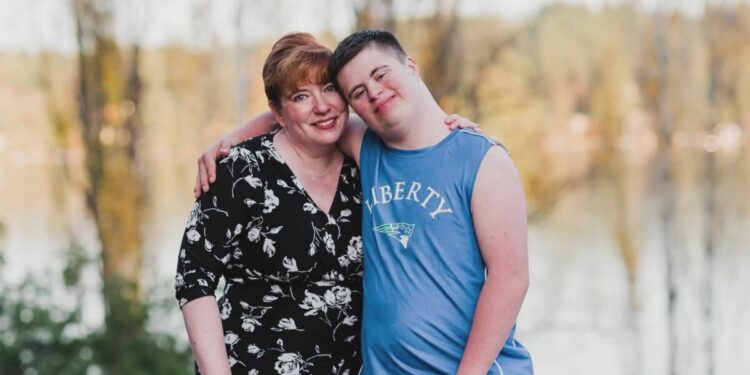The CARE Down Syndrome website is a centralized resource that helps families and health care providers.
Seattle mom Rebecca Partridge is exploring a resource she wishes she had years ago while raising her son, Josh. A new online hub provides families with a central location to educate themselves and their healthcare providers about the needs of adults with Down syndrome.
The Care Down Syndrome program, created by the National Down Syndrome Society, is designed to bridge a critical gap in healthcare. It gives primary care doctors access to research, training, and up-to-date medical information. This tool is expected to help close one of the largest disparities in care for adults with Down syndrome.
“There’s finally a central location where families can send their doctors and where families can get more education about what adults with Down syndrome need,” Rebecca said.
Only about 5% of adults with Down syndrome in the U.S. have access to a specialized clinic, making tools like this one vital for communities across the country. People with Down syndrome are also living up to age 60, up from age 30 in the 1980s.
“Medical education just hasn’t kept up with how much longer people with Down syndrome are living,” said Dr. Brian Chicoine, co-founder and medical director of the Adult Down Syndrome Center in Illinois.
National Down Syndrome Society CEO Kandi Pickard says individuals with Down syndrome stay with their pediatrician probably a little longer than recommended.
“I think that this program and this initiative is helping bridge that gap,” Pickard said.
The program isn’t just for doctors, it is also designed to support families. Rebecca, whose son Joshua is 23, said the website resource would have easily helped her access and navigate healthcare resources when her son was a teenager. She instead was forced to turn to literature.
Joshua, a proud athlete who plays basketball and participates in Special Olympics, is just one example of adults this program aims to support. It was the result of an NDSS survey of the Down syndrome community conducted around 2023.
“It’s difficult to find experts to care for children with Down syndrome,” Rebecca said. “It’s even more difficult to find an expert who really knows adult Down syndrome.”
The hub provides doctors with updated research, guidance for specific medical concerns, and a foundation in evidence-based care, helping ensure that adults like Josh receive comprehensive medical attention. Rebecca is already using the tool to aid her son’s experience with sleep apnea.
“It’s a fantastic resource if I ever have questions about my son,” Rebecca said. “Families can also take this information to their doctors to improve care.”
Dr. Chicoine hopes the program will empower health professionals everywhere to provide better care for adults with Down syndrome.
“We want adults with Down syndrome to be cared for in their communities, close to their families,” Dr. Chicoine said. “This tool helps make that possible.”
With this new resource, families and doctors alike have a centralized, accessible way to stay informed and provide better, more compassionate care.
The 5% specialized clinic access rate highlights severe healthcare infrastructure gaps for adults with Down syndrome, forcing 95% to rely on general practitioners often lacking specific training in conditions affecting this population as they age.
The doubling of life expectancy from 30 in the 1980s to 60 today creates unprecedented medical challenges as the first large cohort of adults with Down syndrome enters middle age with conditions medical schools never trained current physicians to anticipate.
Seattle’s Rebecca Partridge represents countless parents navigating adult healthcare systems designed for pediatric Down syndrome care, where transition planning rarely prepares families for age-related complications like sleep apnea, thyroid issues, and early-onset dementia.
Joshua’s participation in basketball and Special Olympics demonstrates how adults with Down syndrome lead active lives requiring ongoing healthcare support beyond childhood developmental services, yet few primary care physicians understand their unique needs.
The National Down Syndrome Society’s 2023 survey that prompted the website creation likely revealed widespread family frustration with healthcare access, prompting the organization to invest in technology solutions addressing gaps that brick-and-mortar clinics cannot fill.
Dr. Chicoine’s Adult Down Syndrome Center in Illinois represents one of the rare specialized facilities serving this population, with his involvement in the online hub extending Illinois-based expertise to families nationwide who cannot access in-person care.
The tendency for individuals with Down syndrome to remain with pediatricians beyond recommended ages reflects both family comfort with established relationships and primary care physicians’ reluctance to accept adult patients with complex special needs requiring extra appointment time.
Rebecca’s reliance on literature before the website’s existence illustrates how families historically cobbled together information from scattered sources, medical journals, and parent networks rather than accessing comprehensive evidence-based guidance.
The website’s utility for Joshua’s sleep apnea management demonstrates practical applications where families can research condition-specific information and educate physicians who may see few Down syndrome patients and lack familiarity with complications common in this population.
Seattle’s progressive healthcare landscape and strong advocacy community make the city an ideal testbed for digital health resources like CARE Down Syndrome, with local families often early adopters of tools improving care coordination.







